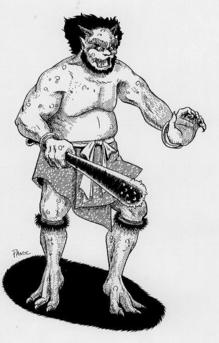(akki means wicked oni)
Oni are creatures from Japanese folklore, variously translated as demons, devils, ogres or trolls. They are popular characters in Japanese art, literature and theatre.
Depictions of Oni vary widely but usually portray them as hideous, gigantic, creatures with sharp claws, wild hair, and two long horns growing from their heads. They are humanoid for the most part but occasionally, they are shown with unnatural features such as odd numbers of eyes or extra fingers and toes. Their skin may be any number of colors but red and blue are particularly common. They are often depicted wearing tiger-skin loincloths and carrying iron clubs, called kanabō. This image leads to the expression "Oni with an iron club" that is to be invincible or undefeatable. It can also be used in the sense of "strong beyond strong" or having one's natural quality enhanced or supplemented by the use of some tool.
The word "Oni" is sometimes speculated to be derived from on, the on'yomi reading of a character meaning to hide or conceal, as oni were originally invisible spirits or gods which caused disasters, disease, and other unpleasant things. These nebulous beings could also take on a variety of forms to deceive (and often devour) humans. Thus a Chinese character meaning "ghost" came to be used for these formless creatures. The invisible Oni eventually became anthropomorphised and took on its modern ogre-like form, partly via syncretism with creatures imported by Buddhism such as the Indian rakshasa and yaksha, the hungry ghosts called gaki, and the devilish underlings of Enma-Ō who punish sinners in Jigoku (Hell).An Oni is often depicted as glutinous, lustful and ill-tempered, though easily distracted by crude humor. The power of flight is usually attributed to it which it will use to fall upon the souls of evil people.
(Source - Wikipedia: http://en.wikipedia.org/wiki/Oni_(folklore)) 





 Edited by Mythical_Geek
Edited by Mythical_Geek